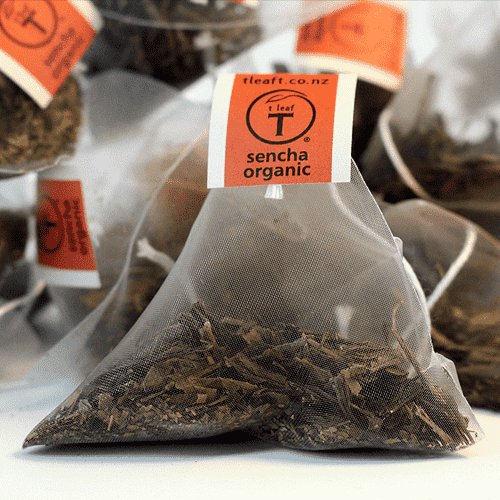Description
A delicious, everyday green tea. This leafy Chinese tea brews to a golden liquor with a flowery green aroma and sweet aftertaste.
Brewing
Use 1 pyramid tea bag per person. Pour freshly boiled water, cooled to 70-80C, over the tea bag and infuse for 2-3 minutes.
Ingredients
green tea.
Tea bag packaging material
There are generally 3 main types of tea bags: Pyramid shaped tea bags made from PLA – Polylactic Acid (t leaf T only uses this type), old style paper tea bags (usually rectangular and heat sealed), Pyramid shaped tea bags, made from nylon.
PLA tea bags – used by t leaf T – commercially compostable and 100% non-gmo
PLA teabags have been around since the mid 2000’s and they are 100% Plant based (non-petroleum based) and our NeoSoilon® Pyramid Tea bags are derived from sugar cane.
PLA (polylactic acid) is mainly extracted from corn or sugar cane and is then spun into thread which is used to weave the clear material that is used in t leaf T’s teabags.
PLA behaves like a plastic, even though it is plant based, this enables the sealing of the tea bags using ultrasonic vibrations that effectively welds the seams together at a specific temperature without the need of petro-chemical based plastics.
PLA tea bags are 100% INDUSTRIAL or COMMERCIALLY COMPOSTABLE -100% NON-GMO
At t leaf T we would love our PLA tea bags to be easily home compostable, but the technology is not there yet. The technology currently exists to achieve home compostability, however it has the tea bag material breaking down in in a matter of weeks so this material would not be a practical option for a long shelf-life like product like tea.
Old Style Paper Tea Bags
Paper tea bags have been around for almost 100 years. They Require heat sealing to close the tea bag because the paper fibres do not naturally adhere to each other. To be able to seal the tea bags, petro-based nano plastics are blended into the tea bag material by the material manufacturers, about 2 % of the teabag, so that when heat and pressure are applied it melts the plastic and the teabag can be sealed.
So, most paper tea bags contain approximately 98% paper fibre, that will break down in home composting, BUT 2% of the teabag is petro-based nano plastics that are not compostable or biodegradable. Not an option for us here at t leaf T.
Nylon Pyramid Shaped Tea Bags
The nylon tea bag material has been around since around 1996 as the PLA technology did not exist at the time. The pyramid tea bags look nice, but the material is entirely a petro-based plastic. The cost of Nylon is substantially cheaper than PLA so low cost driven produces will mostly opt for nylon because of the price.
Nylon is not compostable, or biodegradable so will be around for hundreds of years. Again, not an option for us at t leaf T!
In summary
No teabag solution is perfect but at t leaf T we believe that the PLA material we are using is the most sustainable solution currently for, convenience based, teabags. Every tea we sell is also available in loose leaf and is a better environmentally friendly and sustainable option.
t leaf T’s Commitment to Sustainable Packaging
At t leaf T, we're committed to reducing our environmental impact.
Why Do We Use Stand-Up Pouches?
Our stand-up pouches are made from soft plastic with a thin foil lining. This lining acts as a crucial barrier against light, moisture, and air, ensuring our teas stay fresh and flavorful throughout their shelf life.
In addition to protecting our teas, this type of flexible packaging is more efficient and environmentally friendly than traditional rigid packaging. Here’s why:
- Space-saving: Stand-up pouches ship, store, and dispose of flat, reducing the materials needed to produce them.
- Lower carbon footprint: They require less CO2 to manufacture and transport.
- Efficient design: We print directly on the pouches, eliminating the need for extra labels and further reducing waste.
Why We Don't Use Compostable Packaging
We understand the desire for fully compostable packaging, and we’d love to offer it. However, after extensive testing, we’ve identified two key challenges that prevent us from switching:
-
Limited disposal options: Compostable packaging isn't accepted in council kerbside collections and isn't recyclable, meaning it usually ends up in landfill.
-
Compromised tea quality: Biodegradable and compostable pouches degrade over time, even in storage. Teas need robust protection from light, moisture, aromas, and oxygen to maintain their freshness and flavour. During our tests, we found that compostable packaging allowed cross-contamination of aromas, especially in blends like Chai and English Breakfast. The result? A noticeable reduction in quality, which is unacceptable for our premium teas.
Given these issues, we’ve made the decision to stick with stand up pouches that ensures the highest quality and food safety for our teas.
Looking Forward to a Greener Future
At t leaf T, we're always on the lookout for better, more sustainable packaging options that don’t compromise on quality. Rest assured, we're committed to finding a solution that meets both our environmental goals and your tea standards.





























